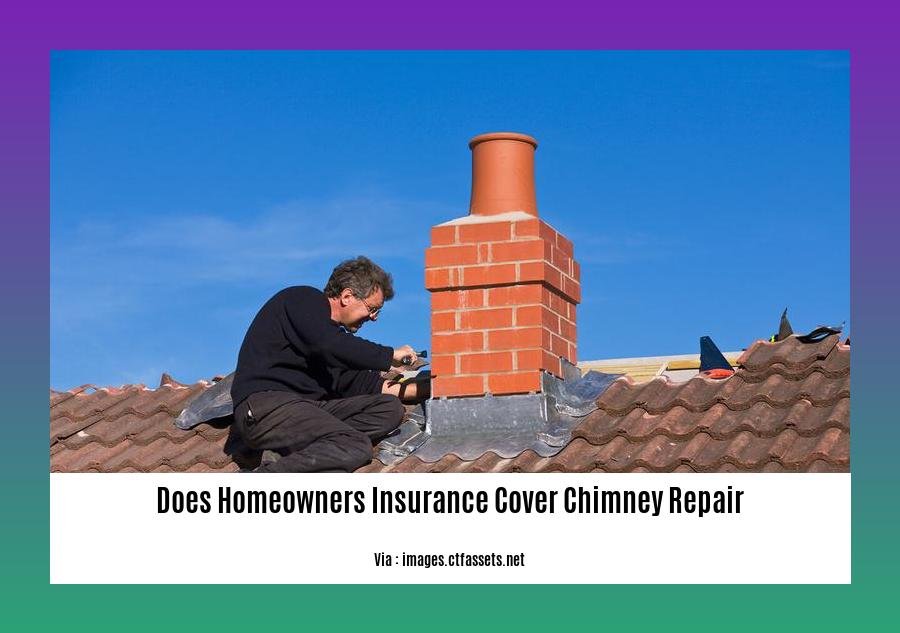Does Homeowners Insurance Cover Chimney Repair: Understanding Your Coverage
When it comes to maintaining a safe and functional home, ensuring your chimney is in prime condition is crucial. However, unexpected chimney damage can be disruptive and costly. Navigating insurance policies to determine coverage for chimney repairs can be challenging. This article delves into the intricacies of homeowners insurance coverage for chimney repairs, providing valuable insights and practical guidance to empower homeowners in protecting their property and understanding their insurance rights.
Key Takeaways:
-
Homeowners insurance will cover chimney repairs if the damage is caused by a covered loss.
-
Normal wear and tear or neglect of chimneys are not covered by insurance.
-
Homeowners insurance will cover damages inside the house caused by chimney damage.
-
Chimney repairs can range from $160 to $750, while a full replacement can cost between $4,000 and $10,000.
-
If a chimney repair claim is denied, the homeowner must pay for the repairs.
-
Rain and snow damage to chimneys are not covered by insurance since they are considered normal wear and tear.
-
Home insurance covers chimney repair only when a sudden and unexpected event, like a fire, lightning strike, or windstorm, causes the damage.
-
Homeowners insurance does not cover chimney cleaning and minor repairs.
Does Homeowners Insurance Cover Chimney Repair?

Chimneys are crucial components of your home, but they can also be vulnerable to damage. A damaged chimney can compromise your home’s safety and comfort, leading to expensive repairs. As a homeowner, it’s essential to understand the coverage your home insurance policy provides for chimney repairs.
When Does Homeowners Insurance Cover Chimney Repair?
Generally, your homeowners insurance will cover chimney repairs if the damage is caused by a covered peril. Common covered perils that can cause chimney damage include:
- Fire
- Lightning
- Hail
- Windstorms
- Explosions
- Vandalism
If your chimney is damaged by any of these perils, your insurance company should cover the cost of repairs. However, it’s important to note that some policies may have exclusions for certain types of chimney damage, such as damage caused by improper maintenance or neglect.
What Factors Affect Coverage for Chimney Repairs?
The amount of coverage you have for chimney repairs will depend on several factors, including:
- The type of chimney damage
- The cause of the damage
- The age of the chimney
- The condition of the chimney
- Your policy coverage limits
Your insurance company will consider all these factors when determining the amount of your claim payout.
Steps to Take if You Need Chimney Repairs
If your chimney is damaged, it’s important to take the following steps:
- Contact Your Insurance Company:
- File a claim with your insurance company as soon as possible.
-
Provide your insurance company with photos and a detailed description of the damage.
-
Get an Estimate for Repairs:
- Obtain estimates for the repairs from qualified contractors.
-
Submit the estimates to your insurance company.
-
Work with Your Insurance Company:
- Work with your insurance company to agree on the cost of the repairs.
-
Once an agreement is reached, the insurance company will issue a check for the repairs.
-
Get the Repairs Done:
- Once you have the check, you can hire a qualified contractor to make the repairs.
Preventing Chimney Damage
The best way to avoid the need for chimney repairs is to take steps to prevent damage. Here are some tips:
- Regular Maintenance:
-
Inspect your chimney regularly and have it cleaned and repaired as needed.
-
Proper Fuel:
-
Use the proper fuel for your type of chimney.
-
Fire Safety:
- Never leave a fire unattended.
-
Keep flammable materials away from the chimney.
-
Inspections:
- Have your chimney inspected annually by a qualified professional.
Conclusion
Chimney repairs can be expensive, but having the right homeowners insurance coverage can help you protect your home and your finances. By understanding your coverage and taking steps to prevent chimney damage, you can ensure that your chimney is safe and well-maintained.
Understanding the coverage of your homeowner’s insurance is crucial. If you have electrical issues at home, find out if your insurance covers them by clicking does homeowner insurance cover electrical problems.
When it comes to homeownership, knowing what your insurance covers is essential. If you’re facing sewer line repair expenses, check if your homeowner’s insurance has you covered. Find out more by clicking does homeowner insurance cover sewer line repair.
Asbestos can be a significant concern for homeowners. If you’re curious about whether your homeowner’s insurance covers asbestos removal or remediation, click does homeowners insurance cover asbestos.
Electrical panel replacements can be costly. If you’re wondering if your homeowner’s insurance covers such replacements, click does homeowners insurance cover electrical panel replacement to learn more.
Detailing the process of filing a claim for chimney repairs, including necessary documentation and communication with insurance providers.

Navigating the complexities of homeowners insurance can be daunting, especially when it comes to filing a claim for chimney repairs. But by understanding the process and gathering the necessary documentation, you can strengthen your case and expedite the reimbursement process.
Key Takeaways:
-
Chimney repairs are often covered by homeowners insurance if the damage is caused by a covered peril, such as fire, lightning, or strong winds.
-
The amount of coverage for chimney repairs depends on your specific policy and coverage limits.
-
To file a claim for chimney repairs, contact your insurance company promptly and provide detailed information about the damage, including photos and estimates from qualified contractors.
-
Collaborate with your insurance adjuster to assess the damage, determine the cause, and agree on a fair settlement for the repairs.
-
Maintain open communication with your insurance company throughout the claims process to ensure a smooth and timely resolution.
Step-by-Step Guide to Filing a Chimney Repair Claim:
- Promptly Contact Your Insurance Company:
Upon discovering chimney damage, immediately notify your insurance company. They will assign an adjuster to handle your claim.
- Document the Damage:
Take clear photos of the damaged chimney, focusing on both the exterior and interior. If possible, include photos of the surrounding area to provide context.
- Obtain Estimates for Repairs:
Contact qualified and licensed chimney repair contractors to obtain detailed estimates for the necessary repairs. Ensure that the estimates include a detailed description of the damage and the proposed repairs, along with the cost breakdown.
- File a Claim Form:
Complete the insurance claim form provided by your insurance company. Accurately provide all the requested information, including policy details, description of the damage, date of the incident, and estimated repair costs.
- Collaborate with Your Adjuster:
The insurance adjuster will visit your property to assess the damage and determine the cause. Cooperate fully and provide any additional information or documentation requested.
- Negotiate a Settlement:
Once the cause of damage is established and the extent of repairs is agreed upon, negotiate a fair settlement with your insurance company. Make sure the settlement amount covers the cost of repairs and any additional expenses incurred due to the damage.
- Complete the Repairs:
Once the settlement is finalized, proceed with the necessary repairs using qualified contractors. Keep all receipts and documentation related to the repairs for future reference.
Effective Communication with Your Insurance Provider:
- Be Clear and Concise:
When communicating with your insurance adjuster, be clear and concise in explaining the damage and the necessary repairs. Avoid technical jargon and provide straightforward explanations.
- Be Organized:
Maintain organized records of all the documentation related to the claim, including photos, estimates, and receipts. This will expedite the claims process and ensure that all relevant information is readily available.
- Be Prompt:
Respond promptly to any requests for information or documentation from your insurance company. Delays in communication can prolong the claims process.
- Be Cooperative:
Cooperate fully with your insurance adjuster during the assessment and investigation process. Provide access to the damaged chimney and any relevant documents or information requested.
By following these steps and maintaining effective communication with your insurance provider, you can navigate the claims process smoothly and efficiently, ensuring a fair settlement for your chimney repairs.
[Sources]
– Chimney Repair and Homeowners Insurance
– How to File a Chimney Repair Insurance Claim
Providing Preventive Measures and Maintenance Tips to Minimize the Risk of Chimney Damage and Associated Insurance Claims
Chimneys, as important as they are for maintaining the warmth and coziness of our homes, require proper care and attention to prevent costly damage and insurance claims. While homeowners insurance may help cover repairs in certain circumstances, proactive maintenance is the key to keeping your chimney in top condition and reducing the risk of damage.
Key Takeaways:
-
Regular maintenance, inspections, and timely repairs can prevent small issues from snowballing into expensive problems.
-
Using the proper fuel and practicing fire safety are crucial in minimizing chimney damage.
-
Prompt action is essential if you notice signs of damage, such as cracks, leaks, or crumbling mortar.
-
Insurance often covers repairs resulting from sudden and accidental events, but neglect and improper maintenance might lead to denied claims.
-
Annual professional inspection can identify potential issues before they cause significant damage.
-
Preventative measures like capping the chimney, installing a chimney screen, and keeping the area clean can work wonders in preventing damage.
Navigating Homeowners Insurance for Chimney Repairs
Chimney repairs resulting from sudden and accidental occurrences like fires or lightning strikes are commonly covered by homeowners insurance. However, it’s essential to understand your policy’s terms and conditions to determine the exact extent of your coverage.
-
Contact Your Insurance Company: In the unfortunate event of chimney damage, immediately contact your insurance provider. They will guide you through the claims process, assess the damage, and determine coverage eligibility.
-
Provide Documentation: Gather and submit detailed information about the damage, including photos, videos, and repair estimates from qualified contractors. This documentation aids the insurance company in evaluating the claim.
-
Work with Your Adjuster: Your insurance company will assign an adjuster to handle your claim. Cooperate and provide any additional information requested to expedite the process.
-
Review the Settlement Offer: Once the damage assessment is complete, the insurance company will present a settlement offer. Carefully review the terms and ensure they adequately cover the repair costs.
-
Obtain Multiple Estimates: Before accepting the settlement offer, consider obtaining estimates from several contractors to ensure you’re getting a fair price for the repairs.
Preventing Chimney Damage: A Proactive Approach
Several proactive steps can be taken to minimize the risk of chimney damage and associated insurance claims:
-
Regular Inspections: Schedule annual inspections by qualified professionals to identify and address potential issues early on.
-
Proper Fuel Usage: Always use the appropriate fuel for your chimney type. Incorrect fuel can lead to dangerous creosote buildup, increasing the risk of chimney fires.
-
Fire Safety Practices: Exercise caution when using fireplaces or wood stoves. Ensure the damper is open before lighting a fire and never leave a fire unattended.
-
Chimney Maintenance: Keep your chimney clean and well-maintained. Regular cleaning helps prevent creosote buildup and other issues that can lead to damage.
-
Chimney Cap Installation: Install a chimney cap to prevent rain, snow, and debris from entering the chimney, causing moisture damage and deterioration.
-
Chimney Screen Usage: Use a chimney screen to prevent sparks and embers from escaping and igniting nearby combustible materials.
-
Address Damage Promptly: If you notice any signs of chimney damage, such as cracks, leaks, or crumbling mortar, take immediate action to address the issue before it worsens.
By following these preventive measures and maintenance tips, you can significantly reduce the likelihood of chimney damage, minimizing the need for insurance claims and keeping your home safe and cozy.
Citations:
Chimcare: Guide to Chimney Repair and Insurance Coverage
Policygenius: Does Home Insurance Cover Chimney Damage?
Including Relevant Resources, Such as Websites of Insurance Companies and Government Agencies, for Further Information and Assistance.
Hey there, homeowners and chimney enthusiasts! We’re diving into the world of chimney repairs and homeowners insurance coverage today. Buckle up and let’s explore whether your trusty insurance policy has your back when it comes to chimney woes.
Key Takeaways:
-
Homeowners insurance generally covers chimney repairs caused by sudden and accidental events like fires, lightning strikes, and even tree tumbles.
-
It’s not all sunshine and rainbows, though. Insurance might not cover regular maintenance or damage due to neglect, so staying vigilant and caring for your chimney is key.
-
Filing a claim for chimney repair involves getting in touch with your insurance company, taking lots of photos of the damage, and getting estimates from reliable contractors.
-
Prevention is always better than cure, so regular chimney inspections and maintenance can save you headaches and hefty repair bills down the road.
Websites of Insurance Companies and Government Agencies for Your Chimney Needs:
-
National Insurance Crime Bureau: Learn about insurance fraud, file a claim, and get tips to protect yourself from insurance scams. www.nicb.org
-
Insurance Information Institute (III): Dig into everything insurance-related, from homeowners to auto insurance, and access helpful resources and guides. www.iii.org
DIY or Call in the Pros?
Minor chimney maintenance tasks like cleaning the area around your chimney or following safety guidelines to prevent fires can be DIY projects. But when it comes to complex issues like repairing cracks or addressing creosote buildup, don’t hesitate to call in qualified professionals. Safety first!
The Bottom Line:
Protecting your home and wallet against unexpected chimney issues is crucial. Regular maintenance, prompt repairs, and understanding your insurance coverage can be your allies in this journey. Keep your chimney in tip-top shape, and you’ll rest easy knowing you’re prepared for any chimney hiccups that may arise.
FAQ
Q1: Can insurance cover chimney repairs?
A1: Homeowners insurance typically covers chimney repairs if the damage is caused by a sudden and accidental event, like a fire, lightning strike, or windstorm. However, normal wear and tear, neglect, or improper maintenance are not covered.
Q2: What are some examples of covered chimney repairs?
A2: Covered chimney repairs include damage caused by fire, lightning, falling objects, strong winds, or vandalism. These events can cause cracks, holes, or structural damage to the chimney. Insurance may also cover the repair or replacement of damaged chimney caps, crowns, or liners.
Q3: What is not covered by insurance for chimney repairs?
A3: Insurance generally does not cover chimney repairs resulting from regular wear and tear, neglect, or improper maintenance. This includes damage caused by rain, snow, ice, or animals. Additionally, insurance may not cover cleaning, minor repairs, or damage caused by pre-existing conditions.
Q4: What should I do if my chimney needs repair?
A4: If you need chimney repairs, contact your insurance company as soon as possible. They will help you assess the damage, determine coverage, and guide you through the claims process. You may need to provide documentation, such as photos or repair estimates, to support your claim.
Q5: What are some ways to prevent chimney damage?
A5: Regular chimney maintenance and inspections can help prevent damage and keep your chimney functioning properly. Ensure the chimney is cleaned and inspected annually by a qualified professional. Additionally, avoiding wood-burning fireplaces, using gas logs instead, and promptly repairing any cracks or damage can help extend the lifespan of your chimney.
- Glass On Tile: A Stylish Kitchen Backsplash Option - December 1, 2025
- Glass Tiles for Kitchen: Style and Durability Tips - November 30, 2025
- Decorative Wall Tiles for Kitchen: Stylish Design Ideas - November 29, 2025










